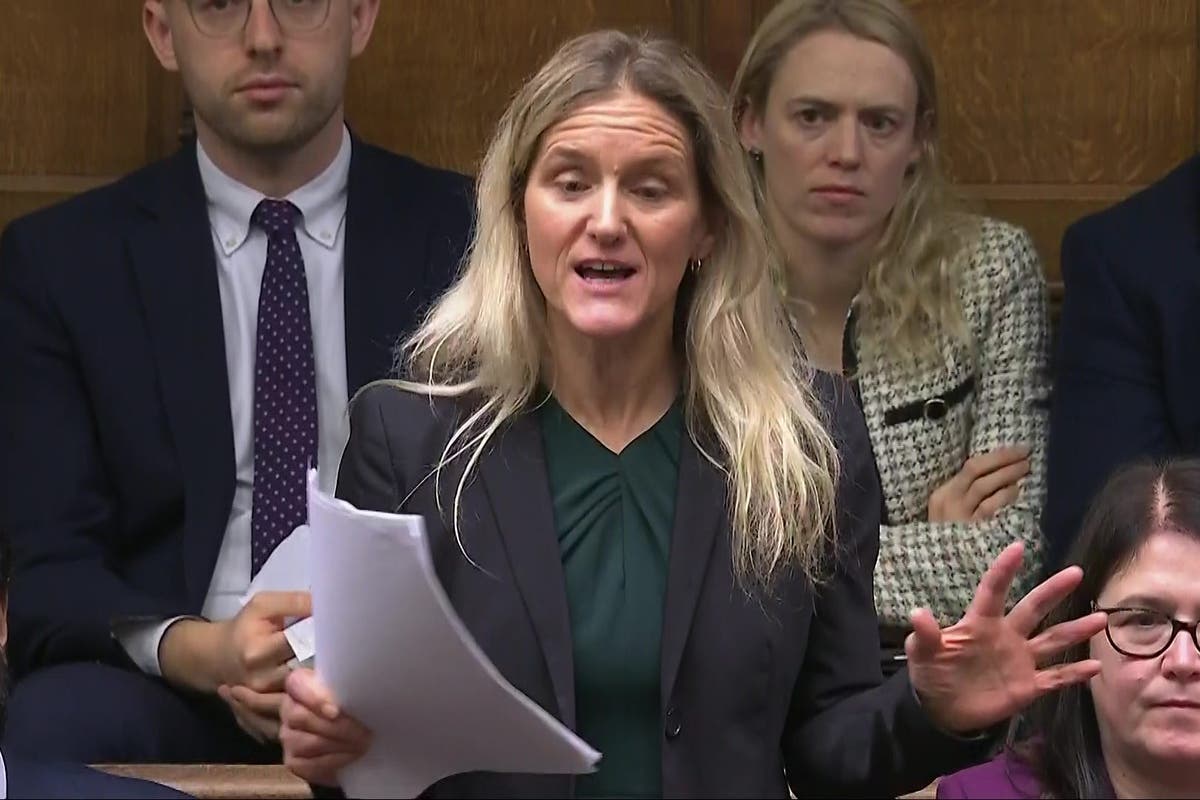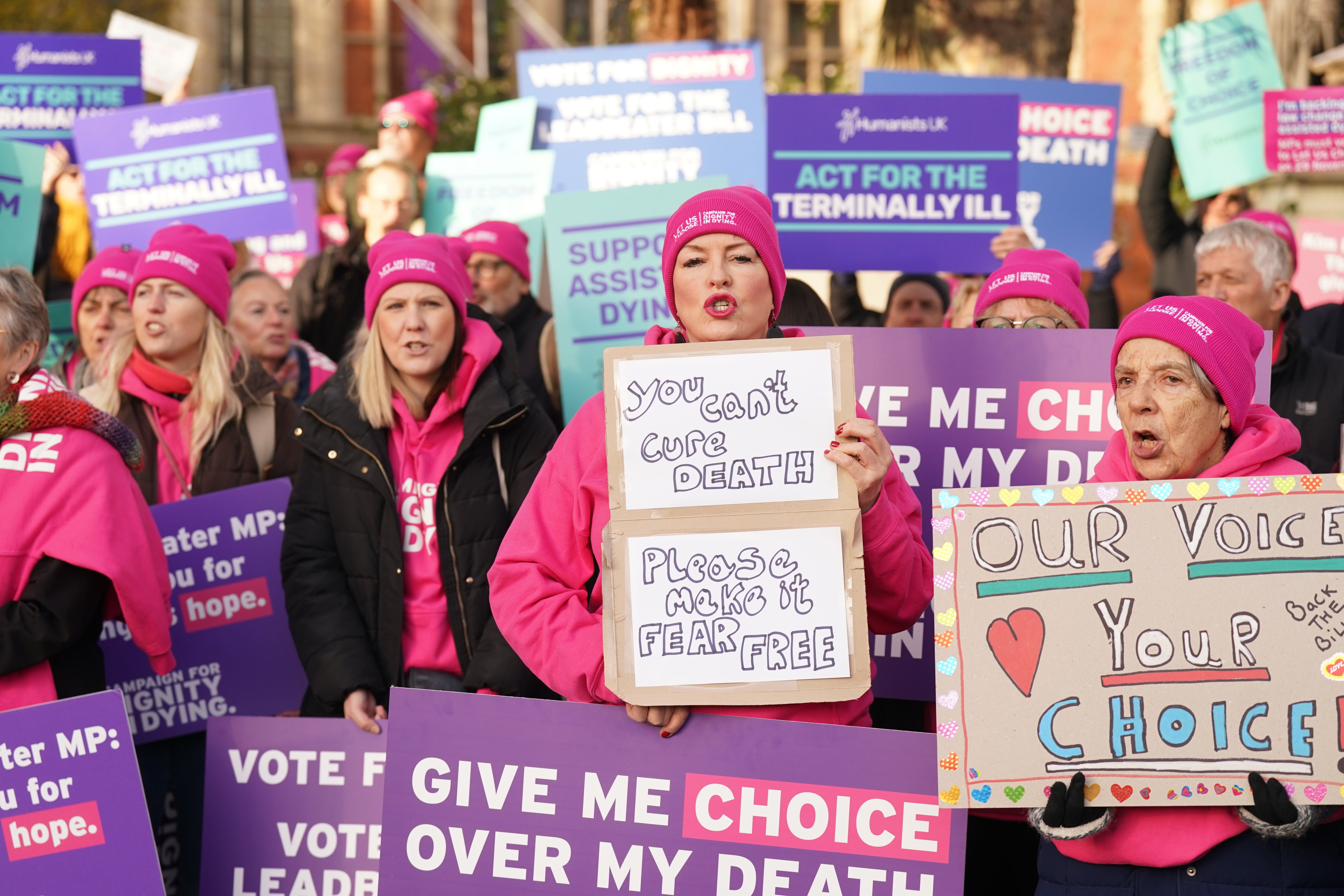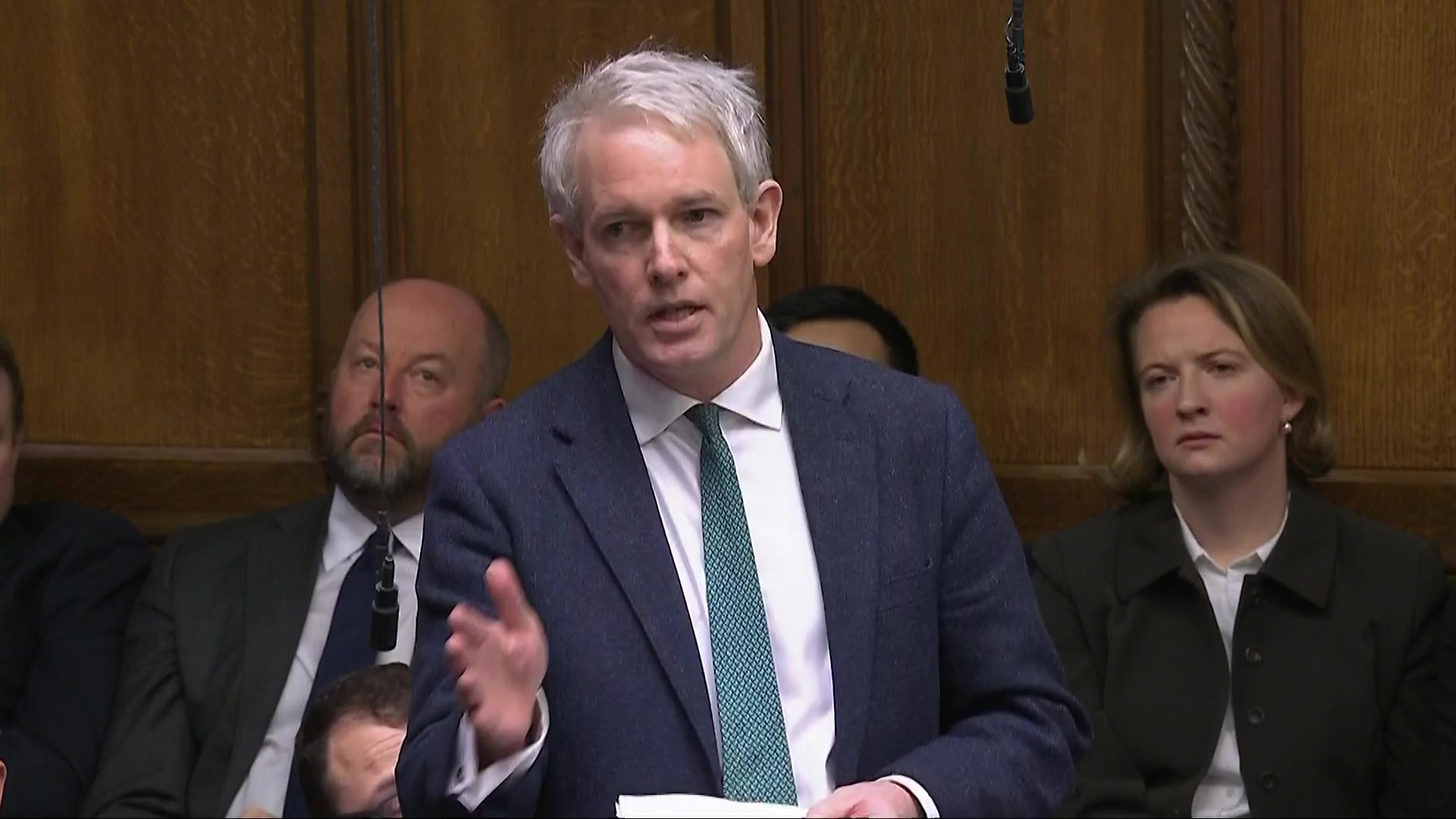Assisted dying bill - latest: MPs vote in favour of historic legislation following fierce debate
The Terminally Ill Adults (End of Life) Bill received 330 ayes and 275 noes, a majority of 55 votes
Your support helps us to tell the story
From reproductive rights to climate change to Big Tech, The Independent is on the ground when the story is developing. Whether it's investigating the financials of Elon Musk's pro-Trump PAC or producing our latest documentary, 'The A Word', which shines a light on the American women fighting for reproductive rights, we know how important it is to parse out the facts from the messaging.
At such a critical moment in US history, we need reporters on the ground. Your donation allows us to keep sending journalists to speak to both sides of the story.
The Independent is trusted by Americans across the entire political spectrum. And unlike many other quality news outlets, we choose not to lock Americans out of our reporting and analysis with paywalls. We believe quality journalism should be available to everyone, paid for by those who can afford it.
Your support makes all the difference.MPs have voted in favour of the assisted dying bill following a fierce commons debate.
The Terminally Ill Adults (End of Life) Bill received 330 ayes and 275 noes, a majority of 55 votes.
In a sign of the level of feeling on the divisive issue, more than 160 MPs made bids to speak during Friday’s Commons debate – the first on the issue in almost a decade.
The bill will now go to the committee stage where MPs can table amendments, before facing further scrutiny and votes in both the House of Commons and the House of Lords, meaning any change in the law would not be agreed until next year at the earliest.
The law would allow terminally ill adults in England and Wales with less than six months to live to end their lives, subject to the approval of two doctors and a High Court judge.
Warning: this article contains information that people might find distressing, including accounts of human suffering.
Five arguments for and against legalising assisted dying
Read the full report from my colleague Tara Cobham below:

Five arguments for and against legalising assisted dying
Bill leads to impassioned arguments from both sides, with Kim Leadbeater arguing MPs have chance to ‘reduce human suffering’, while opposition campaigners warn of ‘inevitable abuse’
Bereaved family members and terminally ill adults watch on as Leadbeater advocates for law change
Watching on as MPs debate assisted dying are a number of terminally ill adults and bereaved family members who are campaigning for the law to be changed.
Sitting in the public gallery is Nat Dye, who has terminal bowel cancer, Sophie Blake, who has secondary breast cancer, and Laura Perkins, who watched her mother die of liver and mouth cancer.
The mood in the public gallery was sombre as Kim Leadbeater paid tribute to Sophie and Nat, saying they would like the right to die with “dignity and compassion”.
“Sophie, who is here today, was diagnosed with stage four secondary breast cancer, which has spread to her lungs, liver and pelvis”, Ms Leadbeater said.
“She is allergic to opioids, so she knows that her pain is very unlikely to be able to be managed. She has a 17-year-old daughter, and all she asks is to have the choice to say goodbye to her at a time of her choosing, in circumstances she can have some control over, and for her daughter to be able to remember her as the vibrant, positive woman she is.”
Nat, she said, says he doesn't know if he would choose an assist to death or not, but he “simply cannot understand why anyone would want to deny him the choice”.
Tory MP Andrew Mitchel U-turns on stance over assisted dying bill
Tory MP Andrew Mitchell has told MPs that he has completely changed his mind on assisted dying, and now supports people’s right to choose how they die.
He said that in the US state of Oregon, which has a similar law to the one being proposed in the UK, there has not been significant expansion of who can have an assisted death.
He argued: “Today we decide on a principle. If the Bill does not go through at second reading this will be the end of the Bill for many years.”
“There will not be a slippery slope unless this Parliament agrees to there being one,” he said.
“This Bill goes with the grain of our constituents’ views - something like 75% (in favour) according to recent polling.”
“Oregon shows us that less people take these steps once they know they’ve got this choice, this back up.”
Woman with severe hypermobility syndrome says she opposes the bill
Joann Taylor, 58, who has a condition called severe hypermobility syndrome, said she opposes the assisted dying Bill.
Speaking at a Disabled People Against Cuts (DPAC) protest outside Parliament, she said: “I’m against it because I don’t feel there should be assistance to kill disabled people before their natural deaths.
“Doctors can be wrong, cures can become available.”
Symptoms of severe hypermobility syndrome include frequently dislocating joints, frequent sprains and strains of muscles, poor balance and fatigue.
Ms Taylor, from Salford, added: “From my own experience, and many others too, of very prolonged miseries that the disabled endure in this country and beyond, our lived experiences aren’t understood by many.”
If the Bill is passed, Ms Taylor said she fears people who are vulnerable, disabled and depressed may make rash decisions.
She said: “Things change, your condition improves and you feel differently about life.”
Concerns for marginalised and disabled people, Dianne Abbott says
Diane Abbott has said she is concerned for how marginalised and disabled people will be affected by the Bill if it passes.
She told MPs: “We will have the NHS as a fully-funded suicide service, but palliative care will not be full funded."
Ms Abbott quoted former prime minister Gordon Brown who has said that “we need to do better at assisted living” before MPs legislate for assisted dying.
She added: “I represent very many vulnerable people in marginalised communities. I cannot vote for a Bill where I have doubts over whether they will be protected”.
Hundreds of protesters outside Parliament in support of assisted dying bill
Hundreds of protesters gathered outside Parliament on Friday calling on MPs to vote for Kim Leadbeater’s private members’ bill to legalise assisted dying.
At Parliament Square, just around the corner from a demonstration against the Bill, protesters dressed in pink held signs asking MPs to “vote for dignity”.
One held a sign saying “my life, my death, my choice”.
Speaking from the protest, Ally Thomson, director of communications at campaign group Dignity in Dying, said: “It’s not a law for people who are making a choice between living and dying, that choice has been made already for them.
“They’re having a choice between two kinds of deaths.
“We know that the majority of the British public are very much in favour of Kim’s Bill.
“We would ask (MPs) to look to the views of their constituents, the voices of those most affected and vote in favour today.”

Diane Abbott: The Bill does not have sufficient safeguards
Mother of the House Diane Abbott MP has risen to oppose the Assisted Dying Bill.
She is arguing that it is “good principle” for the state to not be involved in death. “I have many reservations about this Bill, and in particular I do not believe that the safeguards are sufficient,” Ms Abbott argued.
She has raised the concerns of the former president of the Family Division of the High Court Sir James Munby about the Bill. Sir James questioned whether there would be secret hearings, whether the decisions will be made on papers and whether there would be capacity within the Family Courts to deal with assisted deaths.
Ms Abbott is concerned that judges might be just “rubber stamping” the application, rather than properly testing the situation.
‘The six month cut-off is an arbitrary line in the sand'
Conservative MP Danny Kruger has been making the case against the Assisted Dying Bill, saying that what the Bill would allow in reality is “assisted suicide”.
Mr Kruger MP explained that he also has issues with the assessment carried out by doctors under the terms of the Bill: “It is impossible for doctors to predict with any accuracy whether a person will die within six months…The six month cut off is an arbitrary line in the sand.”
He also argues that this part of the Bill can be legally challenged by those who don’t qualify, expanding those who would qualify for an assisted death.
Reform MP Richard Tice has risen to say that there are specific issues that need be ironed out with the Bill, but that this can happen after the initial vote.
Mr Kruger is arguing that “pretty much anyone with a serious illness” could qualify to this.
Mr Kruger was interupted with a point of order from another MP, who told him to stop using the term “assisted suicide”, but he responded: “What this Bill will do is amend the suicide act, it will allow people to assist a suicide. We do need to use the proper language here.”
He also raises the point that there is no requirement under the terms of the Bill for the judge to actually meet the applicant for an assisted death.
“There is no requirement..for anyone to tell the patient’s next of kin...that the medical and judicial system is working in secret to end the life of their loved one,” Mr Kruger argues.

Labour MP calls for ‘precautionary approach’ to legislation
Labour MP Blair McDougall (East Renfrewshire) called for a “precautionary approach” to the assisted dying proposed legislation.
He added: “The things that have moved me in this debate to opposing this Bill today is that I have also heard stories of disabled people who have heard ‘do not resuscitate’ put on to their medical records without their permission, of them being stopped by strangers in the street and being told ‘you’d be better off dead’, and I know she will say that we are voting today on the specifics of her Bill, but we also voting on a principle.”
Labour MP Kim Leadbeater (Spen Valley) replied: Let’s be very clear the title of the Bill is Terminally Ill Adults. It is not disabled people, it is not elderly people, as someone else referenced. The criteria are very, very clear.”
Tory MP argues bill is ‘too flawed’ to continue beyond today’s vote
Danny Kruger, Conservative MP, is arguing that the bill is “too flawed” to address in the committee stage, beyond today’s vote.
He argues that palliative care needs to get better before assisted deaths are allowed. He told MPs: “If we get our broken palliative care system right.. We can do so much more for all the people we will hear of today. But we won’t be able to do that if we introduce this new option. Instead we will expose many more people to harm.”
Mr Kruger is arguing that doctors can make the suggestion of an assisted death to the patient, under the terms of the Bill.
Andrew George LibDem MP has argued that today’s vote is just to let the Bill go to the next stage, and that any problems can be ironed out later.

Join our commenting forum
Join thought-provoking conversations, follow other Independent readers and see their replies
Comments